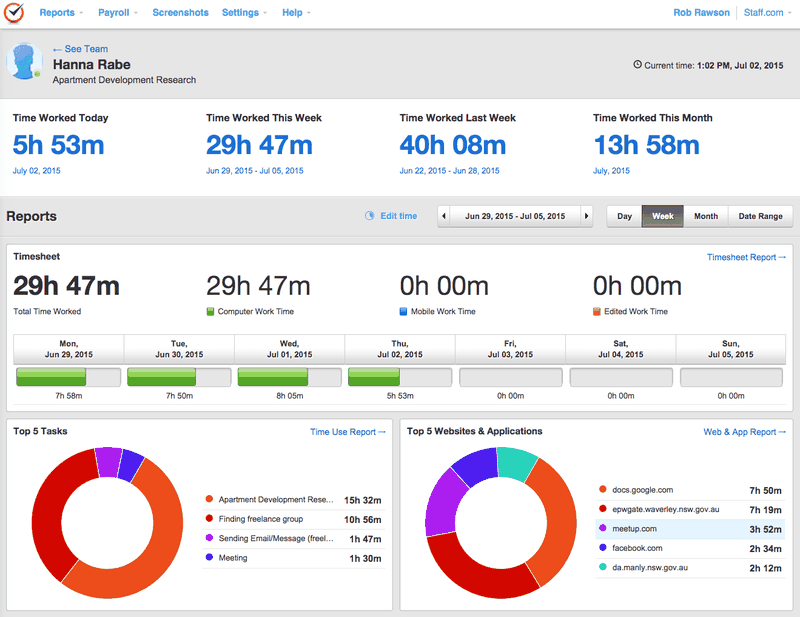For many employees whose jobs don’t require specialized equipment or physical labor – not to mention the current global health crisis – it’s becoming easier and more accepted to work from home.
Technology is making it possible for teams to keep in touch via chat programs, and to hold meetings, conferences, and even training sessions online via video. Most of the software programs that companies use for their daily work are stored on remote servers and can be accessed securely from any location, which makes it easy to get work done from anywhere.
However, many managers who have recently been unceremoniously thrust into work-from-home culture thanks to COVID-19 restrictions may find themselves feeling pretty uncomfortable with this new arrangement. How are they supposed to know if their employees are actually working at all if they can’t see them? How will they know whether they’re focused or doing their best?
Good managers do need a clear idea of what their reports are up to each day. However, monitoring them in the wrong way might do serious damage to their relationships with management — and undo the trusting relationship you’ve been trying to build with them as an employer.
The Tech of Monitoring Remote Employees
As technology advances, employers have an increasing number of options for watching what their employees do during the day.
Popular file sharing programs Google Drive and Dropbox have long had features that allow administrators to see when and how people are accessing files, for example, and plenty of other web-based software tracks things like employee logins and actions taken.
Plus, some employers are taking it even farther and using software expressly designed to monitor employees. Time Doctor co-founder Liam Martin noted in this Protocol article that demand for his product has increased significantly as more companies embrace work-from-home options in the wake of the COVID-19 crisis.
With activity tracking features, managers can view reports and dashboards that break down how employees’ time is used. They may be able to calculate time spent chatting online, time spent in virtual meetings, and time spent on various web sites or online tools. Time Doctor even has features that can record employee keystrokes and store screenshots of employees’ work every few minutes.

Some of these kinds of metrics can be helpful to both managers and employees. However, poring over data and screenshots alone won’t give you the insights you need to get the best work out of your employees.
Those kinds of insights only come about with a respectful, trusting relationship. And it’s pretty difficult to feel trusted and respected if you’re also feeling being spied on and micromanaged.
The fact is that if your managers have to rely solely on data from employee monitoring software to get a sense of whether employees are accomplishing their goals, there are other, deeper problems to address.
The Importance of Clear Expectations
Making sure that employees are meeting expectations isn’t difficult if those expectations have already been clarified in writing.
As we wrote in our post What the Work-From-Home Shift Means for HR, it’s essential that employees who are working remotely understand what’s expected of them under these new conditions.
They may need clarification on what equipment or programs to use at home, for example, or which specific hours they’ll be available.
A lot of assumed expectations will also need to be made explicit, as this helpful article from Gallup explains:
“People learn a lot from context, and the less time they spend in the office, the less context workers have about their manager’s expectations. So managers need to be explicit about what the remote worker must produce. The parameters, deadlines and metrics of tasks must be crystal clear, but so should the manager’s personal feelings. If a manager needs weekly progress reports, for instance, or prompt replies to emails, the manager must say so and hold the employee accountable.”

Frankly, this kind of objective, measurable approach to employee performance isn’t just helpful under these work-from-home conditions. Sticking to clear and measurable guidelines for hiring and advancement is also a best practice for preventing bias and preferential treatment.
As this Harvard Business Review article explains, the more open-ended the criteria for hiring or success are, the more likely they are to be biased.
This is a big problem in annual reviews, in which supervisors often give “open box” responses to how employees are doing, choosing to describe the employee’s performance in their own words. Instead, they should be required to narrow down the criteria for success, and use an objective scale to measure performance “using agreed-upon processes and criteria that are consistently applied across all employees.”
Of course, clear expectations aren’t just for the benefit of managers. Employees also tend to appreciate knowing where they stand and how they will be evaluated. Clarity is a win for everyone.
Returning to a Foundation of Empathy
This is a difficult time.
Your company may be facing financial hardship that’s causing great stress on leadership, and it may be tempting to come down hard on employees in order to continue to make ends meet.
However, your employees are also facing many hardships of their own. Many of them may be sick or caring for a sick family member. Others may have family members on the front lines of the virus. And any employee with kids at home is dealing with the challenges of child care and homeschooling.
The best managers will use this time as an opportunity to improve relationships with employees for the long term. Trust is particularly important during a crisis, but crises are exactly when most employers fail to act in ways that inspire confidence from employees.
If you’re looking for a partner who can help you cultivate a culture of trust at your workplace, we welcome you to reach out to us at ELI.
Our award-winning civility training works for organizations of all sizes and budgets. We specialize in helping employees at all levels understand the importance of empathy. Each of our programs incorporates practice in active listening and effective apologizing. Plus, all of our programs can be taken remotely, with e-learning or Virtual Instructor-Lead Training options.
Use this form to get in touch with us. We look forward to hearing from you!

